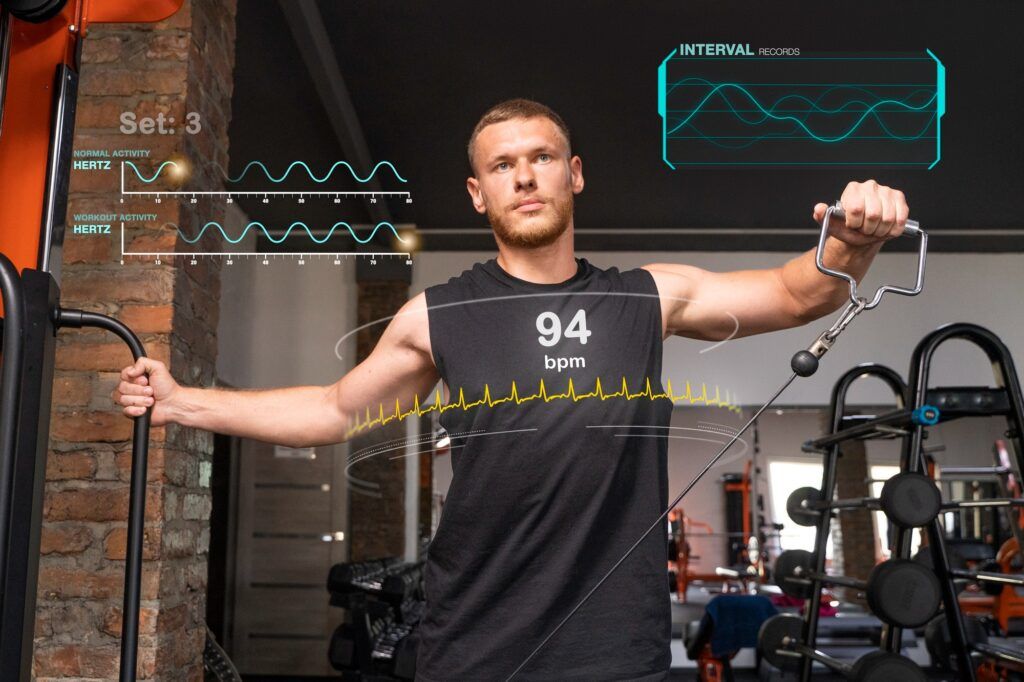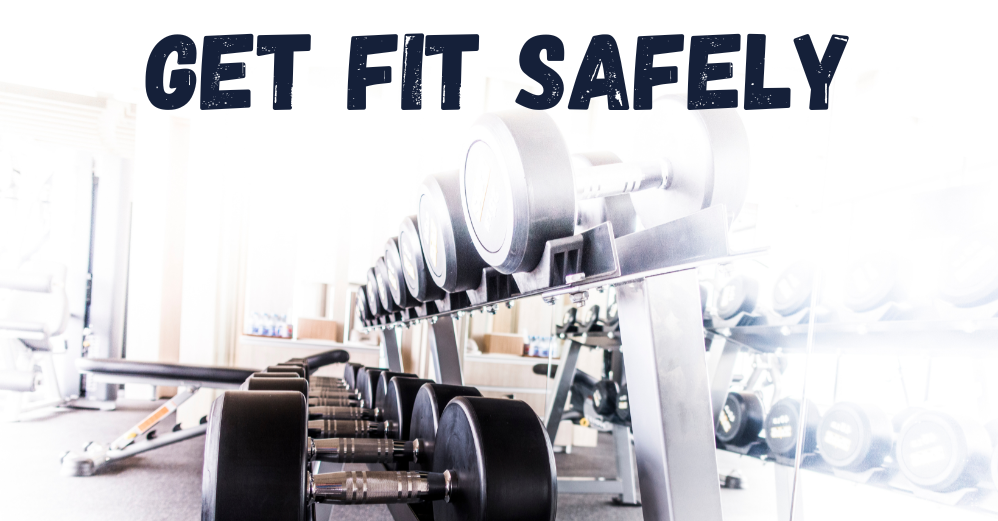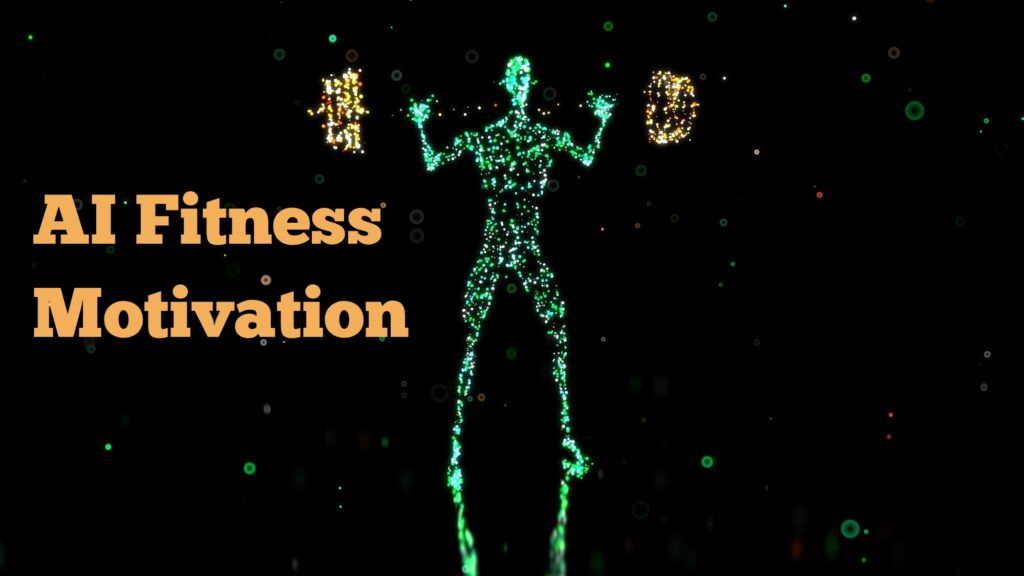We all have days when our motivation to work out hits rock bottom.
It’s frustrating, right?
Honestly, I’ve been there more times than I’d like to admit.
But what if I told you there’s a way to tackle it head-on?
AI is here to pick you up when motivation fades.
This isn’t just a fancy idea—it’s practical and effective.
Let’s dive into how AI can help you stay consistent and inspired.
The Struggle with Motivation: A Common Story

Even after years of training, motivation hasn’t always been easy.
I’ve set ambitious fitness goals like running a marathon.
I’ve chased new PRs at the gym and worked on mastering challenging movements.
But here’s the thing—no matter how much I love training, there are days when it feels like a grind.
Days when getting started feels harder than the workout itself.
Sound familiar?
Staying motivated is a challenge we all face, no matter our experience level.
It’s not about being perfect every day—it’s about finding ways to keep showing up, even when the spark fades.
AI in Fitness: What’s the Hype About?
So, what’s the deal with this AI?
We’re not talking about your average fitness app that counts steps or logs calories.
This is a sophisticated system that learns about you—your habits, preferences, even your moods.
Using machine learning algorithms, it tailors motivational strategies specifically for you.
Imagine having a personal coach who’s always on call, knows when you’re slacking, and sends you just the right nudge to get you moving.
It’s like it can read your mind!
But how does it do that?
Let’s break it down.
How the AI Understands You
The magic lies in data—lots of it.
When you first start using the app, it asks you a series of questions.
Not just the standard “What’s your height and weight?” but deeper stuff like your fitness goals, what times you’re most active, and even what type of motivation resonates with you.
Are you someone who responds to tough love, or do you prefer gentle encouragement?
The AI takes all this information and starts building a profile.
But it doesn’t stop there.
It tracks your activity levels, monitors when you skip workouts, and even pays attention to your sleep patterns if you allow it.
Over time, it gets a pretty accurate picture of your lifestyle.
Creepy?
Maybe a little.
Effective?
Absolutely.
Personalized Motivation Strategies

Here’s Where Things Got Interesting
When I tried out an AI-powered fitness app, it started crafting motivational messages and strategies tailored specifically to me.
For example, I noticed it paid attention to my activity patterns.
Since I tend to be more active in the evenings, I’d get notifications around 5 p.m. that said things like:
“Ready to crush today’s workout? Remember how great you felt after last week’s session!”
It didn’t stop there.
The app even adapted to my off days.
After a restless night, it sent a calming message the next morning:
“Feeling tired? Let’s take it easy today with some yoga.”
I have to admit, it felt like having a supportive friend who knew exactly what I needed to hear.
So why am I not using it now?
Well, after a while, I realized I wasn’t fully taking advantage of the app’s features.
Maybe it wasn’t the perfect fit for my routine, or maybe I missed the human element of training.
That said, it taught me a lot about how personalized support can make a huge difference—and who knows?
I might give it another shot down the line.
Gamification: Making Fitness Fun Again
One of the features that really hooked me was the gamification aspect.
The AI sets up challenges, awards badges for milestones, and even has a leaderboard if you’re the competitive type.
I found myself pushing harder just to unlock the next achievement.
It’s silly, but collecting those virtual trophies gave me a sense of accomplishment.
Plus, the app would celebrate with me: “Congrats on hitting 10,000 steps today! Keep up the amazing work!”
It’s amazing how these small wins can boost your motivation.
Accountability Partners: But Smarter
We all know that having an accountability partner can make a huge difference.
But coordinating schedules with a friend or hiring a coach isn’t always feasible.
This AI fills that gap.
It checks in when you miss a workout: “Hey, we noticed you didn’t log a session today. Everything okay?”
At first, I thought I’d find this annoying.
But surprisingly, it was the gentle push I needed.
It made me feel like someone cared about my progress.
And because it’s AI, it’s always there—no cancellations, no rescheduling.
Adaptive Workouts Based on Your Mood

Here’s a feature that blew my mind.
The AI can adapt your workouts based on your mood.
Using natural language processing, it analyzes your responses and adjusts accordingly.
If you log that you’re feeling stressed, it might suggest a calming Pilates session instead of high-intensity interval training.
One day, after a tough day at work, I opened the app to find a tailored workout: “Let’s unwind with some relaxing stretches tonight.”
It was exactly what I needed.
I know I’ve already mentioned how it adjusted for physical fatigue, but this felt different.
It wasn’t about being tired—it was about helping me unwind and stay on track, even when life felt overwhelming.
This kind of adaptability made the experience feel personal, keeping me engaged no matter how my day went.
Getting More from Wearables with AI
If you use a smartwatch or fitness tracker, the AI takes it up a notch.
By integrating with your wearable devices, it gains access to real-time data like heart rate variability, sleep quality, and activity levels.
This allows it to make even more precise recommendations.
For instance, if your resting heart rate is elevated, indicating potential overtraining or illness, it might suggest a rest day.
It’s basically turning your wearable into the fitness sidekick you always wanted.
Overcoming Plateaus with AI
We all hit plateaus—that frustrating point where progress stalls.
The AI is designed to detect these plateaus by analyzing your performance metrics over time.
When it notices a slowdown, it tweaks your program.
Maybe it introduces new exercises to challenge different muscle groups or adjusts your nutrition plan.
After a few weeks of stagnant results, the AI switched up my routine, incorporating more strength training.
The change reignited my progress and, more importantly, my motivation.
Virtual challenges
I’m not the most social person when it comes to fitness.
Group classes and gym buddies aren’t really my thing.
But the AI offers community features that you can opt into without any pressure.
You can join virtual challenges, share achievements, or even just observe others’ progress for inspiration.
I participated in a virtual 5K run hosted by the app.
Seeing others share their experiences motivated me to push harder, but without the anxiety I usually feel in group settings.
Mental Health Integration
Physical fitness is just one piece of the puzzle.
Mental well-being plays a huge role in motivation.
Some advanced AI apps integrate mental health support.
They offer mindfulness exercises, breathing techniques, and even journaling prompts.
After noticing a pattern of low activity on days I reported feeling down, the AI suggested a short meditation session.
I was skeptical but gave it a try.
Surprisingly, it lifted my mood enough to get me moving again.
It’s a holistic approach that acknowledges the mind-body connection.
Breaking Down Long-Term Goals
Big goals can be daunting.
“Run a marathon” or “Lose 30 pounds” are excellent targets but can feel overwhelming.
The AI helps by breaking these down into manageable chunks.
It sets weekly or even daily goals that contribute to the bigger picture.
I once set an ambitious goal that felt like climbing a mountain.
The AI shifted my focus to smaller steps, like “Let’s tackle this one week at a time.”
Suddenly, the goal felt achievable.
And each small win kept the momentum going.
Real-Time Insights and Adjustments
One of the challenges with traditional fitness plans is the lack of immediate feedback.
You follow the plan but have no idea if it’s truly effective until weeks later.
The AI changes that.
It provides real-time feedback based on your performance.
If you’re consistently exceeding targets, it ups the ante.
If you’re struggling, it dials things back.
During a particularly tough week, I was barely hitting my targets.
The AI noticed and adjusted my workouts to be more manageable.
It felt personalized and kept me from throwing in the towel altogether.
Nutrition Guidance Tailored to You
We can’t talk about fitness without mentioning nutrition.
Some AI platforms offer personalized meal plans based on your dietary preferences, allergies, and fitness goals.
But it’s more than just a static plan.
It adapts based on your feedback.
Didn’t like a suggested meal?
It learns and adjusts future recommendations.
I have a sweet tooth, and resisting desserts is a challenge.
The AI started suggesting healthier alternatives and even incorporated them into my meal plan.
It felt like the app understood my struggles and worked with me rather than against me.
Overcoming the “No Time” Excuse
No time?
AI has you covered.
It knows life gets busy, so it offers quick, efficient solutions tailored to your schedule.
Got just 15 minutes?
It might suggest a high-intensity interval session that maximizes results in minimal time.
Only have 10 minutes?
A quick bodyweight circuit could be your go-to.
AI takes the guesswork out of fitting fitness into a packed day.
Learning from Setbacks
Setbacks are inevitable.
Maybe you miss a week of workouts or indulge a bit too much during the holidays.
Instead of making you feel guilty, the AI takes a constructive approach.
It analyzes what went wrong and adjusts your plan.
After a vacation where I completely fell off the wagon, the AI welcomed me back with a simple message: “Glad to have you back! Let’s pick up where we left off.”
It then eased me back into my routine rather than expecting me to jump in full throttle.
This compassionate approach made it easier to regain my momentum.
Customizing Motivation Styles
Not everyone is motivated the same way.
Whether it’s a firm push or a kind word, everyone’s motivation is unique.
The AI allows you to choose your preferred motivation style.
I experimented with different settings.
When I set it to “Challenge Me,” the messages were more assertive: “No excuses! Let’s get that workout in.”
When I switched to “Encourage Me,” the tone changed: “You’re doing great! Let’s keep the momentum going.”
Having control over this aspect made the experience more personalized and effective.
Integrating Music and Entertainment
Let’s be honest; music can make or break a workout.
The AI can integrate with your music streaming services to curate playlists that match your workout intensity.
It can even adjust the tempo based on your heart rate or the exercise you’re doing.
I was pleasantly surprised when, during a high-intensity interval, my playlist shifted to upbeat tracks that kept my energy up.
During cooldowns, it played softer tunes.
This seamless integration kept me engaged and made workouts more enjoyable.
Social Accountability Without the Pressure
If you’re comfortable with it, the AI can share your progress with friends or family who are also using the app.
This adds a layer of accountability.
Knowing that others can see when you skip a workout can be a powerful motivator.
But the best part is that you control what is shared.
I chose to share my weekly achievements with a close friend.
We started encouraging each other, and it became a friendly competition that pushed me to stay consistent.
Expert Advice at Your Fingertips
Some AI platforms collaborate with fitness experts, nutritionists, and psychologists to offer expert advice.
You can access articles, watch videos, or even participate in live Q&A sessions.
After struggling with late-night snacking, I watched a webinar recommended by the AI on managing cravings.
The practical tips helped me curb the habit, and the AI followed up by adjusting my meal plan to include satisfying evening snacks.
It’s like having a team of experts supporting you.
AI’s Limitations and How to Address Them
Of course, no system is perfect.
There were times when the AI’s suggestions didn’t resonate with me.
Sometimes, I just didn’t feel like working out, and no amount of motivational messages could change that.
But the key is to use the AI as a tool, not a crutch.
I learned to provide honest feedback.
If a particular strategy wasn’t working, I let the AI know.
Over time, it adapted and became more aligned with my needs.
It’s a two-way street—you get out what you put in.
Making the Most of AI Motivation
If you’re considering giving this AI a try, here are some tips to maximize its effectiveness:
- Be Honest in Your Responses: The more accurate information you provide, the better the AI can tailor its strategies.
- Set Clear Goals: Define what you want to achieve. The AI can help you break it down into actionable steps.
- Engage Regularly: Make it a habit to interact with the app daily, even on rest days.
- Provide Feedback: If something isn’t working, let the AI know. It learns and adapts from your input.
- Use the Community Features: Even if you’re not social, lurking in forums or challenges can provide inspiration.
- Balance Technology with Real Life: Remember to listen to your body and mind. Use the AI as a guide, not an absolute authority.
Real-World Examples of AI That Actually Keep You Moving
Let’s get real—AI isn’t just some fancy buzzword; it’s out here actually helping people crush their fitness goals.
Here are a few tools that I’ve either tried myself or heard rave reviews about:
– Fitbod: Think of this app as your personal trainer, but without the awkward small talk. It crafts workouts tailored to your goals, tracks your progress, and keeps things interesting by mixing it up when you need a challenge.
– MyFitnessPal AI: This one’s like having a nutritionist in your pocket. It doesn’t just count your calories; it learns your habits and nudges you toward smarter choices. Like, “Hey, maybe don’t eat that entire pizza for lunch?”
– Noom: Part coach, part cheerleader, and part therapist. This app dives into the psychology behind your habits, using AI to give you personalized tips and motivation. Spoiler: it’s not just about the numbers; it’s about rewiring how you think about food and exercise.
And here’s a stat that blew my mind:
Studies show that 75% of people stick to fitness routines when paired with personalized AI coaching.
I mean, 75%! That’s like winning the motivation lottery.
If you’re like me and need a little push (or maybe a full-on shove) to stay consistent, these apps are worth checking out.
Trust me, having an AI nudge you toward your goals feels way better than beating yourself up for skipping leg day.
So why not give one of these a try?
Worst case, you get some cool new insights.
Best case, you finally stick to your routine without needing a motivational pep talk in the mirror every morning.
Win-win, right?
RELATED:>>> AI-Managed Gyms: Revolutionizing How We Train?
Final Thoughts
Motivation is a tricky beast.
It ebbs and flows, and sometimes it feels impossible to muster the energy to stay on track.
But with the help of AI, staying motivated doesn’t have to be a constant battle.
This technology offers personalized support that’s available whenever you need it.
It’s like having a dedicated cheerleader, strategist, and coach all rolled into one.
So, if you’re tired of starting over every Monday or frustrated with your lack of progress, why not give this AI a shot?
It’s a practical step toward staying consistent and achieving your goals.





